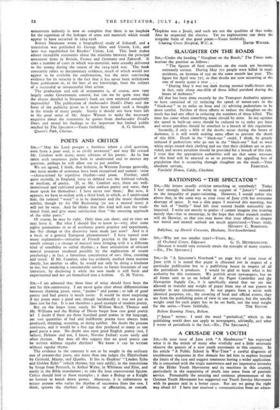POETS AND CRITICS SIR, ŌĆö" May his Lord prosper a business
where a civil question, even from a poor soul, is so civilly answered," and may He reward Mr. Comfort with many, many editions of his poems. As he has taken such courteous pains both to understand and to answer my question, perhaps he will allow me to put another.
We are agreed, I think, that hitherto, in Western Europe generally, two main modes of utterance have been recognised and named: verse ŌĆöcharacterised by repetitive rhythmŌĆöand prose. Further, until quite recently, in England, verse so defined was the habitual vehicle, or medium, of poetry. (If, as Mr. Comfort says, there are well- intentioned and cultivated people who confuse poetry and verse, they must speak for themselves: I have never met them.) But now, it appears, we have to reckon with a third kind, in which, as I understand him, the isolated " word " is to be dominant and the music therefore subtler, though by his Old Reckoning (to use a neutral term) it will not be verse. And he thinks that this kind will oust the tradi- tional kind, and giveŌĆó more satisfaction than "the unseeing approach of the older poets."
Of course, he may be right. Only time can show, and to time we may leave it. But what I should like to know isŌĆöwhy, after some eighty generations or so of assiduous poetic practice and experiment, has this change or this discovery been made just now? And is it a local, or a general European phenomenon? I have turned over many explanationsŌĆöimitation of French practice in the later nine- teenth century ; a change of musical taste bringing with it a different kind of sensibility to verbal rhythm ; a finer articulation of obscure mental processes rendered possible by the exploration of recent psychology ; in fact, a fortuitous concurrence of vers libre, crooning and trend. If Mr. Comfort, who has evidently studied these matters deeply, has another to offer, he would not only be doing a kindness to me, but rendering a considerable service to future historians of our literature, by disclosing it while the new mode is still fresh and experimental and not yet formalised into a fashion. G. M. YOUNG.






























 Previous page
Previous page